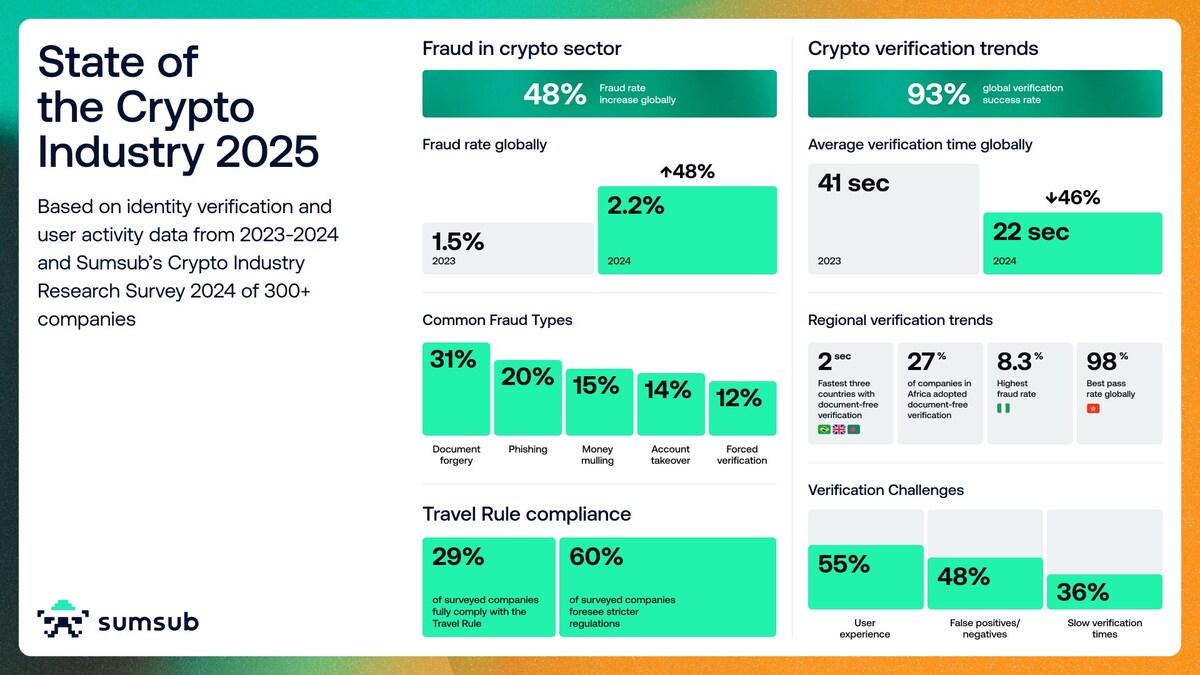
Coining 2024 ‘A Year Of Onboarding’, Sumsub Report Predicts 2025 To Intensify Crypto Infrastructure Needs
With regulations tightening globally and fraud surging by 48%, crypto platforms should be prepared to more traffic increases as well as rising user expectations
LONDON, Feb. 11, 2025 /PRNewswire/ — Sumsub, a global full-cycle verification platform, today released its State of the Crypto Industry 2025 report, offering exclusive data and insights into the major trends, challenges, and innovations shaping the crypto landscape*.
Key highlights:
- 2024 was ‘a year of onboarding’ for crypto exchanges: crypto platforms experienced a 20% rise in traffic during major market events such as the re-election of President Donald Trump and Bitcoin rallies in November 2024.
- Fraud in the crypto industry has soared by 48%, with document forgery constituting 31% of all detected fraud cases.
- 60% of crypto companies foresee stricter regulations, while only 29% fully comply with the Travel Rule.
As the industry navigates a pivotal period of growth and regulation, the report identifies three critical challenges that crypto providers faced in 2024 and should address in 2025 in order to succeed: security threats, technology capabilities, and regulation.
Security challenge: Fraud rising in the crypto sector
Sumsub’s data reveals that fraud in the crypto industry has gone up by 48%, now making up 2.2% of all verification attempts across global crypto platforms. This surge highlights the need for companies to adopt AI-powered detection, biometrics, and continuous monitoring to enhance security. Nigeria recorded the highest rate of fraud across the crypto sector, with 8.3% of verification attempts flagged as fraudulent.
The most popular fraud types are document forgery (affecting 31% of surveyed companies), phishing (20%) and money mulling (15%), followed by account takeover (14%) and forced verification (12%).
Tech challenge: traffic spikes to crypto platforms
Innovations like biometric checks, AI-backed automation and document-free verification have boosted crypto platform users’ onboarding success rates to 93.39% and reduced verification time by 46%, overall improving customer onboarding while reducing drop-off cases.
The report highlights notable innovations like document-free verification, which has enhanced verification times in every country where it was implemented, with an average improvement of 3.6%. The top-three countries with the fastest non-document user onboarding speed of 2 seconds are Brazil, the UK and Bangladesh.
Document-free identity verification has already gained adoption by 19% of surveyed companies worldwide, with Africa leading the way at 27%, showcasing the region’s openness to innovative solutions.
The key user onboarding issues that crypto providers aim to mitigate include: slow verification times, which impact 36% of surveyed companies, as well as false positives/negatives (48%). Furthermore, over half (55%) of companies reported dissatisfaction with overall user experience.
Regulatory challenge: understanding Travel Rule compliance requirements
According to Sumsub’s Crypto Industry Research Survey 2024, three-in-five (60%) companies foresee stricter regulations, emphasizing the need for proactive compliance upgrades. A key focus is the Travel Rule (FATF Recommendation 16), which urges VASPs to exchange sender-recipient information during crypto transfers. However, only 29% of companies fully comply, with unclear guidance cited as a key barrier. The gap between legal requirements rendering global crypto transactions transparent and their disproportional adoption leaves many firms at risk of sanctions and fines.
The study also highlights Sumsub’s analysis of the leading crypto-friendly hubs in 2024 with well-defined regulations, strong infrastructure, and innovation-driven environments.
“The regulatory landscape is evolving rapidly, and crypto businesses cannot afford to fall behind. Europe once appeared to be leading the world with its comprehensive MiCA regulation. However, with the Trump administration promoting crypto and advocating for a digital asset framework, the playing field is shifting. MiCA’s stringent requirements may be challenging for companies to meet, opening the door for the U.S. to reassert itself as the hub of crypto innovation,” comments Ilya Brovin, Chief Growth Officer at Sumsub. “Once deemed the ‘Wild West,’ crypto is now at an inflection point. Companies must adopt robust onboarding technology, strengthen security to protect users from fraud, and ensure compliance to avoid penalties and reputational damage.”
To explore the State of the Crypto Industry 2025 report, please visit https://sumsub.com/crypto-industry-report/
* Note on Sumsub’s research methodology
The study compares internal identity verification and user activity data from 2023 and 2024, covering pass rates, verification time, and fraud attempts across various regions. The report also features Sumsub’s Crypto Industry Research Survey 2024, which includes responses from 300+ companies across the crypto, banking, payments, and e-commerce sectors.
About Sumsub
Sumsub is the #1 verification provider for the crypto industry working with 6 out of 10 top global crypto exchanges. With Sumsub’s customizable KYC, KYB, Travel Rule, Non-Doc Verification, AML Screening, Address Verification, Crypto Transaction Monitoring and Fraud Prevention solutions, you can orchestrate your verification process, welcome more customers worldwide, maximize pass rates, meet compliance requirements, reduce costs, and protect your business.
With over 2500 clients across crypto, fintech, gaming, mobility and edtech industries, Sumsub supports the largest Travel Rule directory of 1700+ virtual asset service providers (VASPs). Having integrated TRP, GTR (owned by Binance), CODE, and Sygna, Sumsub offers fully interoperable single communication Travel Rule protocol, which aims to automate data transfers, reporting, and transaction screening to improve compliance, security, and transparency.

